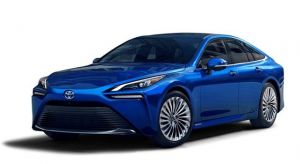We’ve long known gas ain’t good for the planet. But rising fuel costs have only furthered our desire to leave the petrol pump behind. As a result, last year was massive for EV sales, with thousands of Kiwis making the switch … no doubt thanks to a little help from the Clean Car Discount initiative.
And this year, thousands more Kiwis are looking to make the move to electric. However, supply is struggling to meet demand, and customers are facing long delays for popular EV models, like the Tesla Model 3.
But while EVs have swept onto the streets of New Zealand, a different kind of electric vehicle has quietly been making waves abroad.
What are hydrogen cars?
Hydrogen fuel cell electric vehicles (or FCEVs, fuel cell electric vehicles, or just hydrogen cars) are electric vehicles that use hydrogen and a fuel cell to produce electricity. So, technically speaking, hydrogen cars are still EVs.
Only, currently, when we talk about EVs, we tend to mean BEVs (battery electric vehicles) such as the Tesla Model 3, Hyundai Ioniq 5, or the budget-friendly (ish) MG ZS EV.
→Related article: Cheapest Electric Cars (EVs) in New Zealand
Unlike BEVs, which use an external source (electricity from the grid) to charge a battery, hydrogen cars use hydrogen as a fuel, much in the same way traditional cars use petrol.

How do hydrogen cars work?
Hydrogen cars run on electricity, just like regular EVs. The only difference is how that electricity is produced. Unlike BEVs, which store electricity in a battery, hydrogen cars use their hydrogen fuel to generate electricity.
Without getting too technical and scientific, an onboard fuel cell uses a chemical reaction to convert the hydrogen fuel into electricity, generating the car’s own power supply.
That means no waiting around to charge a battery. You simply fuel and go, as with petrol.
And the only by-product of an FCEV is water and warm air!
Compare car loans with Canstar
What benefits do hydrogen cars offer?
There are many benefits to hydrogen fuel cell vehicles, such as:
Zero emissions
The only thing coming out of the exhaust pipe of an FCEV is water vapour. So, much like their BEV counterparts, hydrogen cars are zero emission. Although, like with a BEV, you do have to factor in the process that is used to generate the hydrogen/electricity needed.
For many countries, such as the US, zero-emission cars require high-emission coal or natural gas to generate the electricity needed. Although not ideal, and hardly zero-emission, running an electric vehicle on dirty electricity is still better for the planet than a standard petrol car.
But here in New Zealand, the vast majority of our energy is produced through renewable sources. So the benefits of switching to an electric vehicle are even greater.
They can go the distance
Hydrogen cars have the potential to have excellent range. Last year, a Toyota Mirai travelled 1359.9km on a single tank. Currently, even the very top range BEVs struggle to get half of that. And your average EV wouldn’t even manage a quarter of that!
They’re quick to fill up
Tesla tries to distract you with a large screen for playing Netflix or video games. But, the reality is, if you take your EV on a long road trip, expect to wait around at charging stations. Fast charging can take around 30 minutes, and charging at home can take several hours.
With a hydrogen car, you simply fill up the tank as you normally would, and you’re good to go.
→Related article: EV Power Plans: The Best Power Plans for Electric Vehicles
They could be ‘greener’ to make
EVs are better for the planet than standard internal combustion engine vehicles. There’s no doubt about it. But they aren’t without issues. Namely, to produce batteries requires a host of natural resources (such as lithium and cobalt), which tend to be sourced through some pretty questionable methods. Think child labour and the complete destruction of the surrounding natural environment, for example. You also have end-of-life issues with lithium batteries, which aren’t easily recycled. Although more ethical and sustainable battery types are being explored.
Hydrogen cars, on the other hand, do not require large batteries. So they could be produced in a more sustainable manner.
They’re practical for commercial use
Commercial vehicles pose a challenge for battery electric vehicles. Such vehicles are large and weighty and battery technology isn’t advanced enough yet to deliver the power and range they require.
To compensate, they need several heavy batteries, which only further increases their weight, again, impacting range. Not to mention that all the extra battery capacity needed is expensive, and it reduces the amount of available weight for things like cargo.
As a result, the few electric commercial vehicles that are arriving to market have limited range, and are typically for light-commercial use, like courier vans or small utes. There’s no fully electric logging truck available to buy just yet.
Furthermore, commercial vehicles have tight schedules, so refuelling stops need to be quick. Fast charging a passenger EV takes around 30 minutes for 80% capacity. But if a commercial vehicle has larger batteries or multiple batteries, you could expect charge times to be even longer.
As hydrogen vehicles are light, have plenty of range, and can be refilled quickly, they can essentially work as a like-for-like replacement for petrol and diesel vehicles. So they could be ideal for commercial use.
So why are hydrogen vehicles not as popular as other electric vehicles?
Firstly, it’s worth mentioning that certain countries and companies are beginning to pour big money into hydrogen cars. Japan and Toyota are the notable ones. And, as a result, you can expect the technology to improve, and its popularity to increase. But, currently, hydrogen fuel cell vehicles are a mere fraction of the current EV market.
This is for several reasons:
Creating liquid hydrogen is a lot more complex, and a lot less efficient, than creating electricity
Charging a standard electric car is a pretty simple process. Electricity is generated and then sent to the power grid.
Here in New Zealand, that typically involves using hydropower to generate electricity, which is then fed to the national grid. An electricity retailer then on-sells that power to your home.
Creating liquid hydrogen is not so simple. It’s a complex and energy-hungry process. By the time you factor in transportation to a fuelling station and the process of converting the hydrogen fuel into electricity in a car, the whole process is only about 38% efficient.
That’s fine if you have an unlimited supply of clean, green electricity, but most countries don’t have that luxury. So, currently, while hydrogen-powered cars have the potential to reduce emissions, they are far from energy efficient.
The infrastructure costs
To create the manufacturing capacity to supply millions of hydrogen cars in New Zealand with fuel, and the network to distribute it safely (hydrogen is extremely explosive), would cost billions of dollars and take years to establish.
In comparison the electricity generation and distribution network is already established.
→Related article: Save on Fuel: Five Ways to Beat Petrol Prices
Hydrogen-car technology is still in its infancy
Part of the reason that hydrogen cars aren’t dominating the EV market, is that they’re just not ready to. As mentioned above, for day-to-day passenger vehicles, BEVs are much simpler to produce and run. There are fewer technical problems to solve, and they require a lot less infrastructure.
That means BEVs are currently kilometers ahead in terms of real-world application and practicality.
Are hydrogen vehicles actually a viable future option?
Hydrogen vehicles are a long way behind battery electric vehicles. So comparing them seems a little unfair. But, a lot of people are strong believers in the future of hydrogen cars. And if the infrastructure was there to support them, and renewable energy was being used in the hydrogen process, hydrogen cars could be an excellent option.
They’re zero-emission, light, quick to refuel, and don’t face the same range problems as current battery-powered cars.
On the other hand, hydrogen cars are not without their doubters. Volkswagen (which has made a big push towards battery electric vehicles) stated in 2020, “In the case of the passenger car, everything speaks in favour of the battery and practically nothing speaks in favour of hydrogen.”
Elon Musk shares similar, albeit less eloquent, views on the matter, recently calling hydrogen vehicles “a big pain in the arse”.
The reality is, that at the moment, very few car manufacturers are pushing ahead with significant investments into hydrogen passenger cars. And it’s likely that they will never grow to become the zero-emission passenger cars of the future. But they may have a place alongside them. Green transport doesn’t have to be a war between hydrogen vs. electric.
→Related article: Top Selling Electric Cars in New Zealand
Furthermore, looking at the benefits on offer, hydrogen may play a more significant role in the commercial space. This is an important factor in a country like New Zealand, which is spread out over long distances and has an agricultural backbone reliant on commercial vehicles and heavy machinery.
Toyota, arguably the most high-profile company pushing for hydrogen fuel-cell vehicles, told CNBC it sees hydrogen “as an alternative to fossil fuels in all manner of settings, including heating, lighting, haulage, mass transit and heavy industry”. Even Volkswagen admits that hydrogen has a future in “industry… heavy-duty transport, aviation and shipping”.
If the practicalities of hydrogen are fully exploited, the establishment of the infrastructure needed to fuel FCEVs could be much more justifiable, cost-effective, and comprehensive. But a future in which we are all driving around in hydrogen-powered cars, like the Toyota Mirai, currently, seems unlikely.
Looking for a Great Car Loan?
The table below displays some of the unsecured personal loan products available on Canstar’s database for a three-year loan of $10,000 in Auckland (some may have links to lenders’ websites). The products are sorted by Star Rating (highest to lowest) followed by company name (alphabetical). Use Canstar’s personal loan comparison selector to view a wider range of products on Canstar’s database. Canstar may earn a fee for referrals.
Compare car loans with Canstar

About the author of this page
This report was written by Canstar Content Producer, Andrew Broadley. Andrew is an experienced writer with a wide range of industry experience. Starting out, he cut his teeth working as a writer for print and online magazines, and he has worked in both journalism and editorial roles. His content has covered lifestyle and culture, marketing and, more recently, finance for Canstar.
Enjoy reading this article?
You can like us on Facebook and get social, or sign up to receive more news like this straight to your inbox.
By subscribing you agree to the Canstar Privacy Policy




Share this article